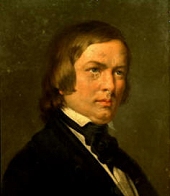|
Xtend
 Listen
Listen
 Period
Period
 Country
Country
 Quotation
Quotation
 Projects
Projects
 Dictionary
Dictionary
 Finders
Finders
|

Born: 8 June 1810, Zwickau,
Germany
Died: 29 July 1856, Endenich, Austria
Schumann, Robert
Like many other composers, Schumann
also abandoned law school, forced upon him by his father, and turned to
music. His hand was injured and his dreams
of a pianist's career vanished. He became a music critic for a magazine
he founded, and identified young geniuses
like Brahms and Chopin
and Chopin ,
and recognized the talents of Mendelssohn ,
and recognized the talents of Mendelssohn and Berlioz
and Berlioz .
He also discovered, in Vienna .
He also discovered, in Vienna ,
forgotten pieces by Schubert ,
forgotten pieces by Schubert and saw to it that they were published.
and saw to it that they were published.
 At
that time, he began writing little pieces for piano (miniatures At
that time, he began writing little pieces for piano (miniatures ),
in which he excelled, and which were played by his pianist wife Clara
Wieck Schumann ),
in which he excelled, and which were played by his pianist wife Clara
Wieck Schumann ,
who promoted his music all her life. Among the works of that period, "Kreisleriana",
and the cycle "Scenes of Childhood" ,
who promoted his music all her life. Among the works of that period, "Kreisleriana",
and the cycle "Scenes of Childhood"    ("Kinderszenen").
He used to name works and movements, yet these were not the mark of a programme
("Kinderszenen").
He used to name works and movements, yet these were not the mark of a programme ,
but more clues to the spirit or mood, and meant to help the listener. Later
on, he turned to symphonies ,
but more clues to the spirit or mood, and meant to help the listener. Later
on, he turned to symphonies (the best one of which was Symphony
No. 3 - "The Rhenish"), chamber
music
(the best one of which was Symphony
No. 3 - "The Rhenish"), chamber
music and exquisite cycles of lieder
and exquisite cycles of lieder  (art songs) like "A
Poet's Love" ("Dichterliebe")
and "A Woman's Life
and Love" ("Frauenliebe
und -leben")
Op. 42.
(art songs) like "A
Poet's Love" ("Dichterliebe")
and "A Woman's Life
and Love" ("Frauenliebe
und -leben")
Op. 42.
He composed musical overtures for drama, expressing the stage content; "Manfred"
and "Scenes from Faust"
are examples of such works. Schumann always admired Bach
for drama, expressing the stage content; "Manfred"
and "Scenes from Faust"
are examples of such works. Schumann always admired Bach ,
and tended to incorporate Classic ,
and tended to incorporate Classic and even polyphonic
and even polyphonic elements, such as canons
elements, such as canons and fugues
and fugues ,
in his work. ,
in his work.
Throughout his entire life, Schumann
suffered a mental illness, and only when it was dormant could he compose.
Nearing the end of his life, his condition deteriorated, and he unsuccessfully
tried to drown himself. He spent his last
few years in a mental institution. In the
course of these years, he could hear one sound that accompanied all his
actions. Nothing could be harsher for a musician.



Schumann on the WWW
 Sites
Sites
|
 Audio
Audio
|
 Video
Video
|
 Images
Images
|
 MIDI
MIDI
|
|
Description
He Was
a critic
He played

He Lived in the
 Romantic period
Romantic period
In
 Germany
Germany
|